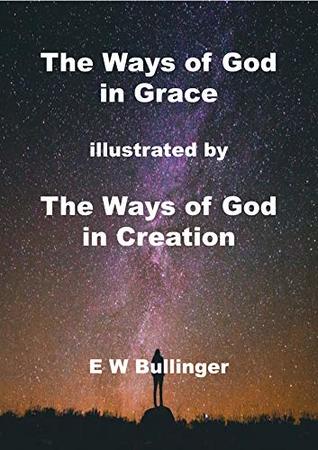- Bible
- Read the Bible
- Bible Versions
- Verse of the Day
- Reading Plans
- Verses by Topic
- Books of the Bible
- Bible Images
- Study
- Commentaries
- Concordances
- Dictionaries
- Encyclopedias
- Sermons
- Bible Atlas & Maps
- BP Wiki
- Devotionals
- Today's Devotionals
- Light of the World
- All Devotionals
- Inspirational Quotes
- More
- Picture Quotes
- Videos
- Inspirational
- Bible Study
- What The Bible Says
- Bible Q&As
- Daily Bread
- Bible by Genre
- Bible Stories
- Random Bible Verse
- Community
- Store
The Ways of God in Grace: Illustrated by The Ways of God in Creation
by E.W. Bullinger
The basis for this book was a Bible Reading given by Dr. E W Bullinger at the Mildmay Conference on the afternoon of Thursday June 23, 1893. He opened the conference with various definitions of ‘grace’ and concluded that:
“Grace is the favour of God when there is nothing to draw it forth, nothing to elicit it any way – the uninfluenced favour of God – and in this view creation was at any rate, in a sense, a work of grace.”
He then went on to say that there was no reason why God should have created; so far as we know for we are not told. There was no necessity upon His part, for “all things are of God.” Continuing on, he stated that it is just the same in the new creation.
The rest of the Bible Reading, and the rest of this book, draws many parallels between the original physical creation recorded in Genesis 1 and 2, and the acts of salvation which results in those who believe in Christ becoming a new creation.
“Grace is the favour of God when there is nothing to draw it forth, nothing to elicit it any way – the uninfluenced favour of God – and in this view creation was at any rate, in a sense, a work of grace.”
He then went on to say that there was no reason why God should have created; so far as we know for we are not told. There was no necessity upon His part, for “all things are of God.” Continuing on, he stated that it is just the same in the new creation.
The rest of the Bible Reading, and the rest of this book, draws many parallels between the original physical creation recorded in Genesis 1 and 2, and the acts of salvation which results in those who believe in Christ becoming a new creation.
BUY NOW
Kindle Edition, 31 pages
Published March 10th 2019 by The Open Bible Trust
© 2025 Bibleportal.com All rights reserved.

E.W. Bullinger (1837 - 1913)
was an Anglican clergyman, Biblical scholar, and ultradispensationalist theologian. In the spring of 1867, Bullinger became clerical secretary of the Trinitarian Bible Society, a position he would hold till his death in 1913. Bullinger was editor of a monthly journal Things to Come subtitled A Journal of Biblical Literature, with Special Reference to Prophetic Truth. The Official Organ of Prophetic Conferences for over 20 years (1894–1915) and contributed many articles.E.W. Bullinger was noted broadly for three works: A Critical Lexicon and Concordance to the English and Greek New Testament (1877); for his ground-breaking and exhaustive work on Figures of Speech Used in the Bible (1898); and as the primary editor of The Companion Bible (published in 6 parts, beginning in 1909; the entire annotated Bible was published posthumously in 1922). These works and many others remain in print (2004).
Ethelbert William Bullinger was born on December 15 in Canterbury, England. He was a direct descendent of the great Swiss Reformer Johann Heinrich Bullinger, a covenant theologian, who succeeded Zwingli in Zurich in December of 1531.
Bullinger was educated at King's College, London. He was a recognized scholar in the field of biblical languages. The Archbishop of Canterbury granted him an honorary Doctor of Divinity degree in 1881 in recognition of his biblical scholarship.
Dr. Bullinger believed in and taught the pretribulation, premillennial rapture. He is also considered an untradispensationalist because he taught that the gospels and Acts were under the dispensation of law, with the church actually beginning at Paul's ministry after Acts 28:28.
Dr. Bullinger died on June 6, 1913, in London, England, leaving behind a legacy of works to help in the study of God's Word.
... Show more